£200m funding to help NHS buy thousands of extra beds to speed up hospital discharges

The Department of Health and Social Care (DHSC) has revealed up to £250 million funding that is set to help speed up hospital discharges.
Backed by up to £200 million, local areas will buy thousands of extra beds in care homes and other settings to help discharge more patients who are fit to leave hospital and free up hospital beds for those who need them.
Discharged patients will be given the support they need from GPs, nurses, and other community-based clinicians to continue their recovery.
By reducing bed blocking, it means patients can be admitted more quickly from A&E to wards, reducing pressure on emergency departments and speeding up ambulance handovers. There are currently around 13,000 people occupying hospital beds in England who are fit to be discharged, DHSC highlights.
This additional £200 million funding is on top of the £500 million Adult Social Care Discharge Fund, which was announced in autumn 2022. The new investment will fund maximum stays of up to four weeks per patient until the end of March. Integrated care boards (ICBs) will begin booking beds that are most appropriate to patients’ needs, according to government.
An extra £50 million capital funding has also been announced by DHSC to upgrade and expand hospitals including new ambulance hubs and facilities for patients about to be discharged.
As ambulance queues can be made worse in some areas due to a lack of physical space, creating ambulance hubs will enable vehicles to manoeuvre more easily to avoid delays handing over patients. The funding boost will also expand discharge lounges in NHS trusts, so that patients can be moved out of acute beds while they wait to be discharged to help further reduce bed blocking.
Health and Social Care Secretary Steve Barclay said: “The NHS is under enormous pressure from Covid and flu, and on top of tackling the backlog caused by the pandemic, Strep A and upcoming strikes, this winter poses an extreme challenge.
“I am taking urgent action to reduce pressure on the health service, including investing an additional £200 million to enable the NHS to immediately buy up beds in the community to safely discharge thousands of patients from hospital and free up hospital capacity, on top of the £500 million we’ve already invested to tackle this issue.
“In addition, we are trialling six National Discharge Frontrunners – innovative, quick solutions which could reduce discharge delays, moving patients from hospital to home more quickly.”
As part of measures set to be announced later today (9 January 2023), six national Discharge Frontrunners will lead the way to explore new long-term initiatives to free up hospital beds.
Sussex Health and Care, the Northern Care Alliance, Humber and North Yorkshire, One Croydon Alliance, Leeds Health and Care Partnership, and Warwickshire Place have all put forward ideas that will help the patients in their area move out of hospital more quickly whilst providing continuity of care.
These ideas include dedicated dementia hubs, new offers of provision for rehabilitative care, and creating effective data tools to help manage demand for discharge of medically fit patients.
This new programme will trial long term solutions to issues which result in patients staying in hospital longer than necessary.
For instance, Leeds is looking to improve how health teams in their local hospitals are working with those providing community services, such as rehabilitation, which will mean better support locally for patients who need support after a hospital stay.
Minister for Care Helen Whately commented: “Getting people out of hospital on time is more important than ever. It’s good for patients and it helps hospitals make space for those who need urgent care.
“We’re launching six Discharge Frontrunners to lead the way with innovations to help get people out of hospital and back home.
“Winter is always hard for the NHS and social care, and this year especially with flu in high circulation. That’s why we provided the £500 million Adult Social Care Discharge Fund earlier in the winter.
“As well as helping people right now, we’re looking ahead to make our health and care system work better next winter and beyond. These problems are not new but now is the time to fix them for the future.”

